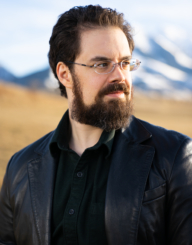Now that I’ve finished the Inheritance Cycle, and now that I’m moving on to new stories, I’ve been thinking about the craft of worldbuilding in a way that I haven’t since before I started Eragon. Of course, I spent a lot of time fleshing out the history, peoples, and cultures of Alagaësia while I was writing the series, but in a way, all those details were superficial, since they were based upon the fundamental assumptions I had made when starting out. I reexamined those assumptions when it seemed appropriate, but for plot reasons, the majority of them remained unchanged.
When beginning a new story or creating a new world, however, it’s essential to think about the underlying philosophy of your work, because that will influence the shape of everything that follows. For example, when I started the Inheritance Cycle, I accepted as a given that heroes could defeat villains, determination could overcome the vagaries of chance, the world is essentially knowable and understandable, and that there are wonderful things to be seen wherever we look. In comparison, George R. R. Martin took a very different approach when constructing A Song of Ice and Fire, and it shows in every line of his books.
So. How to decide what your philosophy ought to be? Ultimately, I think that depends on how you see the world, and what you want to say about it. Then, the trick is to apply that throughout your story.
And yet . . . one of the hardest parts of world building is allowing for differences, for contradictions. As important as it is to be consistent, I believe it’s equally important to have a certain amount of variation. If every element of your story/world presents only one point of view, it can end up feeling monotonous. Or worse, preachy. The real world is full of exceptions, so why shouldn’t yours as well?
Still, getting your brain to see things from other angles can be hard. Sometimes I think of it like a puzzle that you can only solve if you step back and try something that you normally wouldn’t. When starting out, consider every relevant possibility, even if you end up discarding most of them. The times when I find a twist or variation, it feels like something inside of my mind has physically shifted. Hard work, but always worth it.
Once you’ve decided upon your philosophy, then comes the more tradition elements of world building: histories, names, technology, family trees, major events, and so on. I enjoy this stage, but I try not to get too caught up in it, because I could spend the rest of my life inventing details for an imaginary world (or worlds). I only work out the bare minimum of details I need for my story, knowing that I’ll always invent more along the way.
And then . . . and then comes the scariest part. Then I have to condense and encapsulate everything I’ve come up with into a story that people will hopefully enjoy reading. It’s an exhilarating experience, but also terrifying—a rush of head-clearing adrenaline that focuses my mind like few things do.
World building is a wonderful thing, and I find it immensely satisfying, but in the end, it has to serve your story, not the other way around.
And yes, as you might have guessed from all of this, I’m busy constructing a setting for a story even now, the largest such setting I’ve ever attempted. It’s rather daunting, but I think it’s going to make for some awesome books. We’ll see.
Sé onr sverdar sitja hvass,
Christopher
Note: This essay was previously published on Lytherus.com on January 25, 2013.




